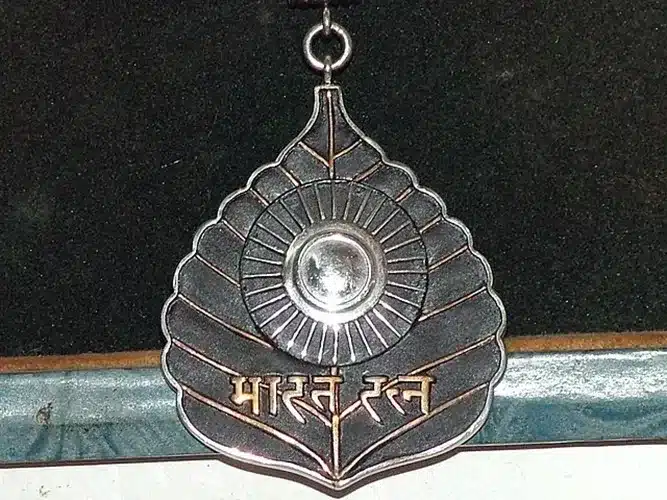Bharat Ratna award: Its significance and recipients

Bharat Ratna is the highest civilian award in the Republic of India. It is awarded by the President of India to individuals who have made exceptional contributions to the nation in the fields of art, literature, science, and public service. The award was established in 1954, and it is considered one of the highest honors that can be conferred upon a citizen of India. It is awarded in recognition of outstanding contributions to the nation, and recipients of the award are selected by a committee of the government of India.
The medal
Each of the recipients gets a peepal leaf medallion along with a Sanad (certificate) signed by the President. Here are other significant features of the medal:
- The medallion is cast in Bronze.
- The medallion is designed like the leaf of peepal tree with sunburst in the centre and Bharat Ratna is engraved underneath it.
- On the backside, the emblem of India is embossed and Satyameva Jayate is inscribed in Devanagari script.
- The medallion is worn around the neck using a white ribbon.
- The award does not carry any monetary endowment.
Criteria for selection of award recipients
There are no specific criteria for the Bharat Ratna award, and the selection process is relatively open-ended. The award is typically given to individuals who have made a significant impact on the nation and have demonstrated a high level of excellence in their field of work.
- The award was initially restricted to accomplishments in literature, science, arts, and public services, but the government of India expanded the conditions to comprise “any field of human endeavor” in 2011.
- There is no written provision that Bharat Ratna should be awarded to Indian citizens only.
- Recently Government of India has altered guidelines for the eligibility of persons from the sports field for the Bharat Ratna.
However, some general guidelines are followed while selecting the recipients of the award. These guidelines include:
- The award is given to individuals who have made exceptional contributions to the nation in any field, including art, literature, science, and public service.
- The award is given to individuals who have demonstrated a high level of excellence in their field of work.
- The award is given in recognition of outstanding contributions to the nation.
- The award is given to individuals who have made a significant impact on the nation.
- The award is given to individuals who have made a significant contribution to the nation’s development and progress.
- The award is given to individuals who have demonstrated a high level of leadership and public service.
- The award is given to individuals who have made a significant contribution to the promotion of national unity and integration.
- The award is given to individuals who have made a significant contribution to the promotion of international understanding and cooperation.
- As of September 2021, a total of 48 individuals have been awarded the Bharat Ratna, the highest civilian award of the Republic of India. The award was instituted in 1954 and is bestowed “in recognition of exceptional service/performance of the highest order”, without distinction of race, occupation, position, or sex.
Recipients of the Bharat Ratna award
Here is a list of all the individuals who have been awarded the Bharat Ratna:
- Dr. Sarvepalli Radhakrishnan (1954)
- Dr. C. Rajagopalachari (1954)
- Chandrasekhara Venkata Raman (1954)
- Dr. Bhagwan Das (1955)
- Dr. Mokshagundam Visvesvarayya (1955)
- Pandit Jawaharlal Nehru (1955)
- Govind Ballabh Pant (1957)
- Dr. Dhondo Keshav Karve (1958)
- Bidhan Chandra Roy (1961)
- Purushottam Das Tandon (1961)
- Dr. Rajendra Prasad (1962)
- Dr. Zakir Hussain (1963)
- Pandurang Vaman Kane (1963)
- Lal Bahadur Shastri (1966)
- Indira Gandhi (1971)
- Varahagiri Venkata Giri (1975)
- K. Kamaraj (1976)
- Mother Teresa (1980)
- Acharya Vinoba Bhave (1983)
- Abdul Ghaffar Khan (1987)
- M. G. Ramachandran (1988)
- B. R. Ambedkar (1990)
- Nelson Mandela (1990)
- Sardar Vallabhbhai Patel (1991)
- Rajiv Gandhi (1991)
- Morarji Desai (1991)
- Abul Kalam Azad (1992)
- Satyajit Ray (1992)
- J. R. D. Tata (1992)
- Aruna Asaf Ali (1997)
- Gulzarilal Nanda (1997)
- A. P. J. Abdul Kalam (1997)
- Chidambaram Subramaniam (1998)
- M. S. Subbulakshmi (1998)
- Dr. Amartya Sen (1999)
- Jayaprakash Narayan (1999)
- Gopinath Bordoloi (1999)
- Ravi Shankar (1999)
- Lata Mangeshkar (2001)
- Ustad Bismillah Khan (2001)
- Bhimsen Joshi (2009)
- C. N. R. Rao (2014)
- Sachin Tendulkar (2014)
- Atal Bihari Vajpayee (2015)
- Pandit Madan Mohan Malaviya (2015)
- Pranab Mukherjee (2019)
- Nanaji Deshmukh (2019) (posthumous)
- Bhupen Hazarika (2019) (posthumous)
Interesting aspects of Bharat Ratna award
Here are a few interesting aspects of Bharat Ratna award
- The award was established by the formal President of India Rajendra Prasad on 2nd January 1954.
- The concept of awarding this award posthumously was not there in the original statute declared in January 1954.
- Provision to award posthumously was finally added in the January 1966 statute of this prestigious award.
- First Bharat Ratna was awarded to Sarvapalli Radhakrishnan, Sir C.V. Raman, and Chakravarti Rajagopalachari in 1954.
- Sachin Tendulkar is the first sportsperson and the youngest Bharat Ratna Award, the recipient.
- In 1992, Subhash Chandra Bose was awarded Bharat Ratna posthumously. As there is no solid evidence of Subhash Chandra Bose’s death his family declined to receive the award.
- The number of yearly awards is constrained to a maximum of three in a specific year.
Observer Voice is the one stop site for National, International news, Sports, Editor’s Choice, Art/culture contents, Quotes and much more. We also cover historical contents. Historical contents includes World History, Indian History, and what happened today. The website also covers Entertainment across the India and World.

